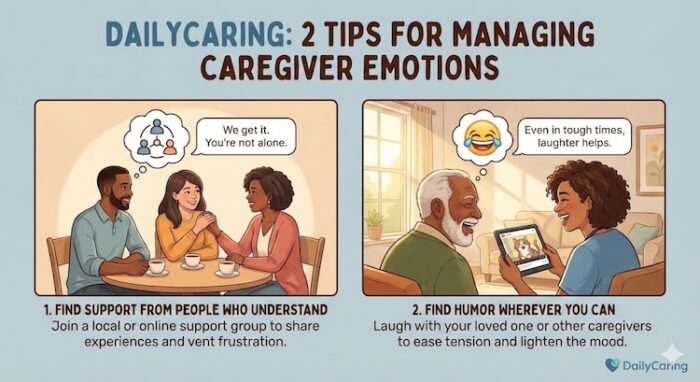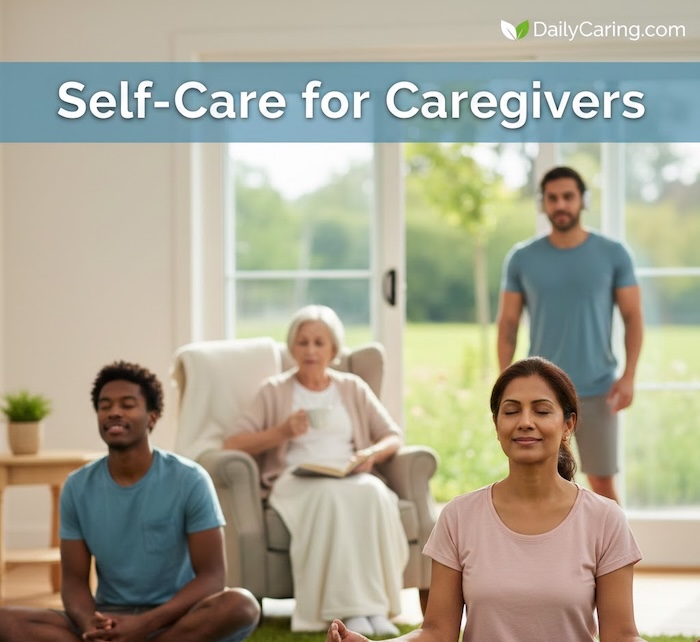The emotional landscape of caregiving is a complex terrain of love, frustration, exhaustion, and guilt; sometimes all within the same hour! It’s normal to feel overwhelmed by complicated feelings like anger, resentment, or grief, yet many caregivers suffer in silence, believing these emotions are wrong or shameful.
They are not. They are a human response to an immensely challenging role. Let’s normalize these tough feelings and explore two powerful, practical strategies to help you navigate them with compassion for yourself and reclaim a sense of balance.

Emotions Are a Significant Cause of Caregiver Stress
Caring for an older adult is a stressful challenge that often takes a toll on your health.
But only part of that stress comes from juggling day-to-day tasks. A major contributor is the intense emotions that naturally arise during caregiving.
To reduce the stress from caregiver emotions, we asked experienced social worker Florence Marchick for advice.
She’s worked with aging adults and their families for over 24 years, so she truly understands the challenges caregivers face.
We explain how to identify common caregiver emotions, and Florence shares her two best tips for managing them.
How to Identify Common Caregiver Emotions
Identifying and acknowledging your emotions is the first step to dealing with them.
Have you had any of these thoughts? If so, you’re definitely not alone. Florence has spoken with countless caregivers who have these same feelings.
Guilt
- I’m not doing enough.
- I promised I would always care for Dad at home.
- I should be doing a better job.
- I shouldn’t be feeling angry or resentful.
Sadness and depression
- I’ve lost so much.
- I can’t cope.
- I can’t stand for things to be this way.
- It’s hopeless, there’s nothing I can change.
Loneliness
- I feel abandoned. Friends and family have dropped away.
- I have nobody to talk to anymore.
- My social life is nonexistent. When would I have time for outside relationships?
- I can’t socialize. I have to stay home all the time to watch Mom.
2 Tips for Managing Caregiver Emotions
There’s no sugarcoating it, caregiving is a complex and sometimes thankless job that comes with plenty of strong emotions.
Here are Florence’s top 2 pieces of advice that she always recommends to families she works with.
1. Find support from people who understand
Finding people who really “get it” might mean going to a local support group, joining an online support group, or talking with friends and family who are also caring for older adults.
Today, 1 in 5 people are caring for an aging adult, so it won’t be too hard to find someone who’s having similar experiences.
Venting your anger and frustration and sharing your experiences makes you feel better and takes a weight off your shoulders.
Talking with others is also a chance to give and receive tips for solving the problems that keep you up at night.
And sometimes, talking through a problem can lead you to a brilliant solution or help you accept a difficult decision.
2. Find humor wherever you can
As the saying goes, you can either laugh or cry.
Finding the humor wherever you can, even in dark times, is an excellent coping technique.
After you’ve had a good cry, move on to finding the laughter whenever possible.
Don’t feel guilty about looking for humorous moments; you’re not laughing at your older adult. You’re laughing at a ridiculous situation.
Often, your laughter could inspire your older adult to laugh too. That eases tension and lightens the mood.
Another reason to talk with others who are also caring for seniors is to laugh together about things only caregivers would understand.
You’re like co-workers in the field of caregiving, poking fun at the crazy parts of your job. Trying to share the joke with non-caregivers often doesn’t work.
Recommended for you:
- 4 Ways to Reduce Stress from Caregiver Emotions
- Caregiver Guilt: Two Common Myths Increase Stress
- Reduce Caregiver Stress by Celebrating Accomplishments
Guest expert: Florence Marchick has a Master’s in Social Work and has been working in the field since 1978. For over 24 years, she has been working with older adults. Before her retirement, she was the social worker at Rosener House Adult Day Services program in Menlo Park, CA. This included working with families during the enrollment process, family counseling, and running several support groups for caregivers.
Rosener House offers an enriched therapeutic day program in a caring, protective environment. Rosener House promotes independence and dignity for aging adults facing challenges and limitations, including Alzheimer’s, dementia, early memory loss, mild cognitive impairment, stroke, Parkinson’s, and other chronic conditions
About the Author

Connie is the founder of DailyCaring.com and was a hands-on caregiver for her grandmother for 20 years. (Grandma made it to 101 years old!) She knows how challenging, overwhelming, and all-consuming caring for an older adult can be. She also understands the importance of support, especially in the form of practical solutions, valuable resources, and self-care tips.













Thank you to all the contributors , it has helped me a lot to understand what I’m up against with my husband who has graduated from mild Alzimers to full dementia virtually since Christmas 2022! You have given me a few options to look into going forward!
My dad has been in a long-term care facility since July, 2017. He has vascular dementia, and was getting very frequent UTIs, was retaining urine so needed a catheter which he kept pulling out. The night before he left for the hospital for what we didn’t know would be his last night home, had I not been staying overnight at my parents’ home, both parents would have been on the floor as Dad fell, but I caught him.
My mom lives in elderly housing about 2 miles away, and has chronic pain. I am the only one around who can take care of Mom, and even though the nursing facility is only 5 minutes from my home, you have to do some driving on the highway, which my mom cannot do.
I have fibromyalgia, and 4 beautiful grandchildren who I take care of often. I don’t want their growing up years to be lost, nor do I want to miss out on my parents’ last years. (They are both 85)
I have such guilt and anxiety about not visiting my Dad enough, and when I do visit my anxiety goes through the roof as I never know whether he will think I am there to bring him home, or if he will be sad, or if he will be his cheerful self (he is such a love!)
I am looking for a therapist to try to sort out all these feelings – I feel like I can never do enough for my mom or my dad. The facility is wonderful, full of caring people. I just realized that this article and comments are from a few years ago, but does anyone have any advice? Does anyone else feel this way? I did go to a support group/class and I got a lot out of it, but most of the participants were taking care of their loved ones at home. This is so hard, isn’t it?
This is certainly a challenging situation to be living in. A therapist would be able to help you find ways to cope and improve your well-being.
We’ve got an article that might be helpful – 4 Sources of Affordable Counseling Services to Reduce Caregiver Stress https://dailycaring.com/low-cost-therapy-options-help-caregivers-cope/
You may also want to explore different caregiver support groups online to find one that suits your needs. We’ve got suggestions here – 13 Caregiver Support Groups on Facebook https://dailycaring.com/support-groups-for-caregivers-on-facebook/
My problem is my daughter is the one I am caregiver for .I am 72. She has no one else to care for her. Sometimes she is fine but I am scared of whats going to happen to her when I can no longer care for her . I just don;t know what to do
It’s good that you’re thinking ahead about your daughter’s care. You may want to put together a care and financial plan that takes effect in case you’re no longer able to care for her. You may want to speak with an attorney and a financial planner to find out about options and to get help with planning.
My mom is a stroke survivor and after caring for my mom for two and a half years her health declined and she could no longer stand, walk, or use her right hand. She spent one week in the hospital and four weeks in rehab but no improvement! I made the decision to mover her to long term nursing home care… my mom cried when my sister and I told her the news! Then she would not talk to us or give us eye contact all that day! My sister lives out of state and will be leaving soon! I am the only one who care gives for my mom and didn’t feel that I could continue! However, I’m now feeling guilty like I have let her down! She’s only been in long term nursing care for two days and I feel so sad! And she is very sad!
I’m so sorry that you’re both going through this 🙁 It’s a tough adjustment to make and often takes time. This article may be helpful — 3 Reasons to Stop Feeling Guilty About Putting Mom in Assisted Living https://dailycaring.com/3-reasons-to-stop-feeling-guilty-about-putting-mom-in-assisted-living/
If the patient/elderly can make decisions, help them to do it by not letting them know that your’e aware; it’s ethical and simple. Ask several times a day, “Do you need help for anything? Many will answer “No,” out of pride, self esteem issues, even if they would like to say, “Yes.” Let them do it, once you’re sure they can. They will not hurt themselves. “Let them do it,” can’t be stressed enough. No need for guilt, anxiety, etc. We often under-estimate their abilities to be more independent. Conversely, spend time together doing fun things: everyone likes company eating, walking for leisure, reading mail, or just being in the same room during quiet times.
how do you deal with a patient tthat will not do anything to help them selves
This can be complex. It often depends on whether or not the person is still able to make sound decisions for themselves. If they’re neglecting themselves purposely, but are of sound mind, that is one issue. You cannot force a competent adult to do something they don’t want to do, even if it’s good for them. It’s different if the person has dementia and their symptoms are interfering with daily life and cause them to be unable to care for themselves. This article has information that can help — http://dailycaring.com/4-tips-to-deal-with-seniors-who-refuse-help/
There is a great book for not only caregivers but for life in general. It’s called”what to say when you talk to your self” A 20 min nap also helps.
Thank you for the book recommendation, we’ll have to check it out! And we completely agree, a little rest does wonders for the spirit.